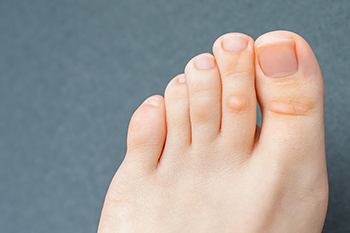Corns are patches of thickened, hardened, raised skin that can develop on the soles of the feet or on the toes in response to excessive pressure or friction. Your skin contains a protein called keratin. This protein holds the skin cells together and helps your skin protect itself from the elements. When your skin is exposed to friction or pressure over and over again, it responds by producing a thick, tough layer of keratin over the injured area, leading to a corn or callus. Although corns arise as a protective measure, they can sometimes cause more harm than good. You may find that a corn is causing you pain or discomfort when you walk, or that it rubs against your shoes uncomfortably. In some cases, a corn can also become infected. If you have painful corns, it is suggested that you see a podiatrist for treatment.
Corns can make walking very painful and should be treated immediately. If you have questions regarding your feet and ankles, contact Dr. Thomas E. Silver of Westwood Foot Clinic. Our doctor will treat your foot and ankle needs.
Corns: What Are They? And How Do You Get Rid of Them?
Corns are thickened areas on the skin that can become painful. They are caused by excessive pressure and friction on the skin. Corns press into the deeper layers of the skin and are usually round in shape.
Ways to Prevent Corns
There are many ways to get rid of painful corns such as:
- Wearing properly fitting shoes that have been measured by a professional
- Wearing shoes that are not sharply pointed or have high heels
- Wearing only shoes that offer support
Treating Corns
Although most corns slowly disappear when the friction or pressure stops, this isn’t always the case. Consult with your podiatrist to determine the best treatment option for your case of corns.
If you have any questions please feel free to contact our office located in Golden Valley, MN . We offer the newest diagnostic and treatment technologies for all your foot and ankle needs.
Read more about Everything You Need to Know About Corns
